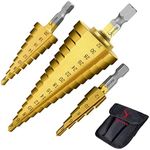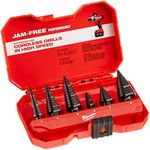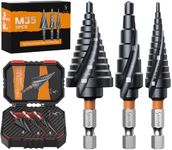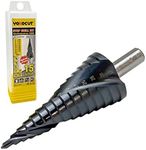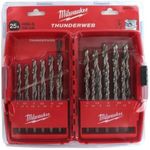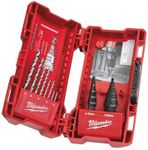Buying Guide for the Best Step Drill Bits
Step drill bits are essential tools for anyone who needs to drill holes of various sizes in materials like metal, plastic, or wood. They are particularly useful for tasks that require precision and versatility, such as electrical work, plumbing, and DIY projects. When choosing the right step drill bit, it's important to consider several key specifications to ensure you get the best performance and longevity from your tool. Understanding these specs will help you make an informed decision based on your specific needs and the materials you will be working with.MaterialThe material of the step drill bit is crucial because it determines the bit's durability and effectiveness. Common materials include high-speed steel (HSS), cobalt, and titanium-coated bits. HSS bits are suitable for general-purpose drilling in softer materials like wood and plastic. Cobalt bits are more durable and can handle harder materials like stainless steel. Titanium-coated bits offer a balance of durability and performance, making them ideal for frequent use on a variety of materials. Choose the material based on the hardness of the materials you will be drilling.
Size RangeThe size range of a step drill bit refers to the range of hole diameters it can create. This is important because it determines the versatility of the bit. Step drill bits typically have multiple steps, each corresponding to a different hole size. For general use, a bit with a wide size range (e.g., 1/8 inch to 1/2 inch) is ideal as it can handle various tasks. If you have specific needs, such as drilling larger holes, look for bits with larger maximum diameters. Consider the range of hole sizes you will need for your projects to choose the appropriate size range.
Number of StepsThe number of steps on a step drill bit indicates how many different hole sizes it can create. More steps mean greater versatility, allowing you to drill a wider range of hole sizes with a single bit. However, more steps can also mean smaller increments between sizes, which is useful for precision work. If you need a bit for general-purpose use, a bit with fewer steps and larger increments may be sufficient. For detailed and precise work, choose a bit with more steps and smaller increments.
Shank TypeThe shank type of a step drill bit affects how it fits into your drill. Common shank types include round, hex, and tri-flat shanks. Round shanks are standard and fit most drills, but they can slip under heavy loads. Hex shanks provide a more secure fit and are less likely to slip, making them ideal for high-torque applications. Tri-flat shanks offer the best grip and are designed to prevent slipping entirely. Choose the shank type based on the type of drill you have and the nature of your drilling tasks.
CoatingThe coating on a step drill bit can enhance its performance and longevity. Common coatings include black oxide, titanium nitride, and cobalt. Black oxide coating provides basic protection against rust and wear, making it suitable for general-purpose use. Titanium nitride coating offers superior durability and reduces friction, which helps the bit stay sharp longer and drill more efficiently. Cobalt coating is the most durable and is ideal for heavy-duty applications and drilling hard materials. Choose the coating based on the frequency of use and the toughness of the materials you will be drilling.
